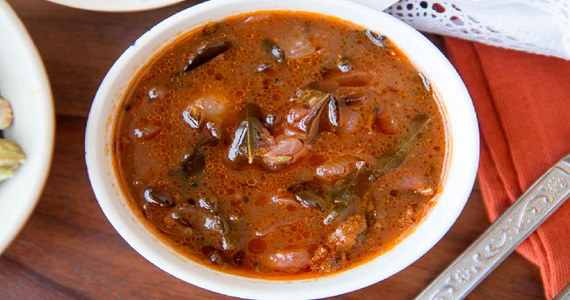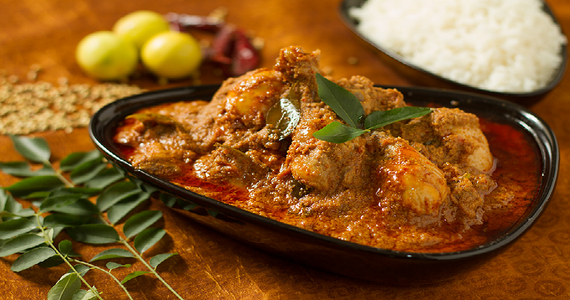
Pudukkottai, located in Tamil Nadu, has a cuisine that beautifully blends traditional Tamil flavours with mild Chettinad influences. The food here is known for its balance of spice, tang, and earthy ingredients. Whether you are a vegetarian or a non-vegetarian, there’s plenty to explore — from classic rice meals to authentic curries and snacks.
1. Puli Kuzhambu
What It Is: A tangy tamarind-based curry prepared with vegetables like brinjal (eggplant), drumstick, or okra, cooked with spices and tempered with mustard seeds and curry leaves.
Why You Should Try It: Puli Kuzhambu is a staple in Tamil households, representing the soul of local cuisine — spicy, tangy, and full-bodied.
Where to Find It: Most vegetarian restaurants and traditional Tamil eateries in Pudukkottai serve this dish, usually during lunch.
Tourist Tips:
- It pairs best with steamed rice.
- Ask for a mild-spice version if you are not used to South Indian heat.
- Add papad or curd to balance the tanginess.
2. Kothamalli Chutney (Coriander Chutney)
What It Is: A refreshing chutney made from fresh coriander leaves, coconut, green chillies, and a touch of tamarind.
Why You Should Try It: It’s a Pudukkottai favourite — aromatic, green, and adds a fresh flavour to idlis, dosas, or even rice.
Where to Find It: Almost every local breakfast eatery or mess serves this chutney with South Indian breakfasts.
Tourist Tips:
- Try it with hot idlis or crispy dosas early in the morning.
- Request for a small portion if you are trying chutneys for the first time (some are spicy).
3. Karuvadu Kuzhambu (Dry Fish Curry)
What It Is: A bold, spicy curry made from sun-dried fish cooked in tamarind gravy with traditional spices.
Why You Should Try It: This is a local delicacy that reflects the rustic flavours of rural Tamil Nadu — salty, smoky, and spicy.
Where to Find It: Popular in non-vegetarian eateries and local “mess” restaurants in Pudukkottai town.
Tourist Tips:
- The flavour is intense; it’s best enjoyed with rice and curd.
- Non-fish eaters can skip this and opt for vegetable Kuzhambu instead.
- Have water handy — it’s spicy but delicious.
4. Keerai Masiyal (Mashed Greens)
What It Is: A wholesome dish made with boiled spinach or amaranth leaves, mashed with lentils and seasoned with mustard and garlic.
Why You Should Try It: It’s a comforting, healthy dish showcasing Tamil Nadu’s love for green leafy vegetables.
Where to Find It: Served as part of a traditional “meals” platter or thali in vegetarian restaurants.
Tourist Tips:
- Pair it with hot rice and a bit of ghee for authentic taste.
- Great for health-conscious travellers seeking lighter options.
5. Vazhakkai Varuval (Raw Banana Fry)
What It Is: Thinly sliced raw banana pieces marinated with turmeric, chilli powder, and salt, then shallow-fried until crispy.
Why You Should Try It: A delicious vegetarian side dish that’s crunchy on the outside and soft inside — simple yet full of flavour.
Where to Find It: Served in almost every Tamil-style lunch thali.
Tourist Tips:
- Best enjoyed fresh and hot.
- Excellent companion for rice, sambar, or curd rice.
- Mild in spice and easy on the stomach.
6. Murungakkai Sambar (Drumstick Sambar)
What It Is: A lentil-based curry cooked with drumsticks, tamarind, and spices — one of Tamil Nadu’s most-loved dishes.
Why You Should Try It: The unique taste of drumstick mixed with the rich aroma of sambar makes this dish memorable.
Where to Find It: Available at almost every vegetarian restaurant or “mess.”
Tourist Tips:
- Eat it with rice or idli for an authentic Tamil meal.
- The drumsticks are fibrous — chew gently and discard the outer layer.
7. Ragi Kali with Kaatu Chutney
What It Is: A traditional dish made with ragi (finger millet) cooked into a dense porridge-like ball, served with a spicy “kaatu” chutney made from green chillies or herbs.
Why You Should Try It: A traditional and healthy meal rich in calcium and fibre, often eaten by locals for breakfast or lunch.
Where to Find It: Traditional vegetarian eateries or local homes during breakfast hours.
Tourist Tips:
- Has an earthy flavour — try small portions first.
- Excellent for those looking for healthy and authentic local food.
8. Kuzhi Paniyaram
What It Is: Soft, round dumplings made from fermented rice and urad dal batter, cooked in a special moulded pan and served with coconut chutney.
Why You Should Try It: Crispy outside, soft inside — a snack that captures the homely side of Tamil cuisine.
Where to Find It: Street stalls and small tiffin centres in Pudukkottai, especially in the mornings and evenings.
Tourist Tips:
- Try both spicy and sweet versions if available.
- Pair with chutney and filter coffee for a perfect local snack.
9. Idli and Dosa
What It Is: Soft steamed rice cakes (idli) and thin crispy pancakes (dosa), served with chutneys and sambar.
Why You Should Try It: Though found everywhere in Tamil Nadu, Pudukkottai’s versions often include unique chutneys such as coriander or tomato-onion.
Where to Find It: Any local tiffin centre or vegetarian hotel.
Tourist Tips:
- Have it fresh for best taste.
- Try masala dosa if you prefer a heartier option.
- End your meal with traditional South Indian filter coffee.

10. Chicken or Mutton Chettinad Curry
What It Is: A spicy, aromatic meat curry made with freshly ground spices, coconut, pepper, and curry leaves — inspired by the neighbouring Chettinad region.
Why You Should Try It: Pudukkottai lies near the Chettinad belt, and this dish represents the area’s bold culinary heritage.
Where to Find It: Non-vegetarian restaurants and Chettinad-style hotels.
Tourist Tips:
- Perfect with steamed rice, parotta, or idiyappam.
- Ask for mild spice if you’re not used to strong flavours.
- Best enjoyed during lunch or dinner.
Additional Food Tips for Tourists in Pudukkottai
- Meal Timings:
- Breakfast: 7:00 AM – 10:00 AM
- Lunch: 12:00 PM – 3:00 PM
- Dinner: 7:00 PM – 9:30 PM
- Spice Levels:
- Pudukkottai food tends to be spicy. Politely request a milder version if needed.
- Hygiene & Safety:
- Choose busy restaurants for fresh food. Avoid street food that’s been sitting too long.
- Payment:
- Many restaurants accept UPI or cards, but small stalls prefer cash.
- Drinks:
- Try the local South Indian filter coffee — rich, aromatic, and served piping hot.
- Festive Foods:
- During Pongal (January), you’ll find Sakkarai Pongal (sweet rice dish).
- During Deepavali, shops sell Adhirasam and Murukku in abundance.
- Local Eating Experience:
- Visit a small “mess” or local canteen for an authentic Tamil-style meal served on a banana leaf.